Hippie Lifestyle Illusion
The idealized image we associate with hippies today are all part of the hippie lifestyle illusion.
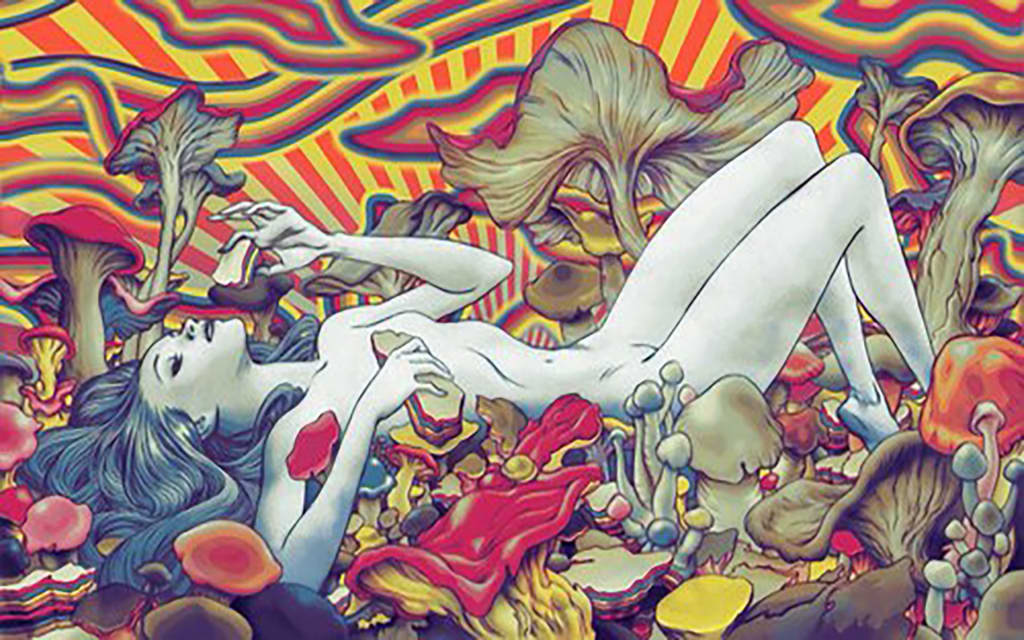
You are a hippie. Think about it—what are hippies? People with beards and long hair who enjoy doing drugs, listening to music, and rejecting conventional values. Everyone’s experienced that before, haven’t they? Most of us have experimented with our hairstyle or facial hair and have taken a puff of pot here or there. As for “rejecting conventional values,” that sounds like today’s average young adult at some point or another.
Hippies are people too, and their lifestyle isn’t all carefree and centered around smoking weed as their stereotype portrays. The only difference between you and a hippie might be that “natural” smell they have, or your style in clothing—unless you also wear Grateful Dead t-shirts. Having lived through the 50s and 60s as a “flower child,” Michael Minick knows the ins, outs, and culture of the hippie life. The following is Minick’s account from 1971, in which he reminisces on The Summer of Love and the days of the hippie lifestyle illusion of freedom.
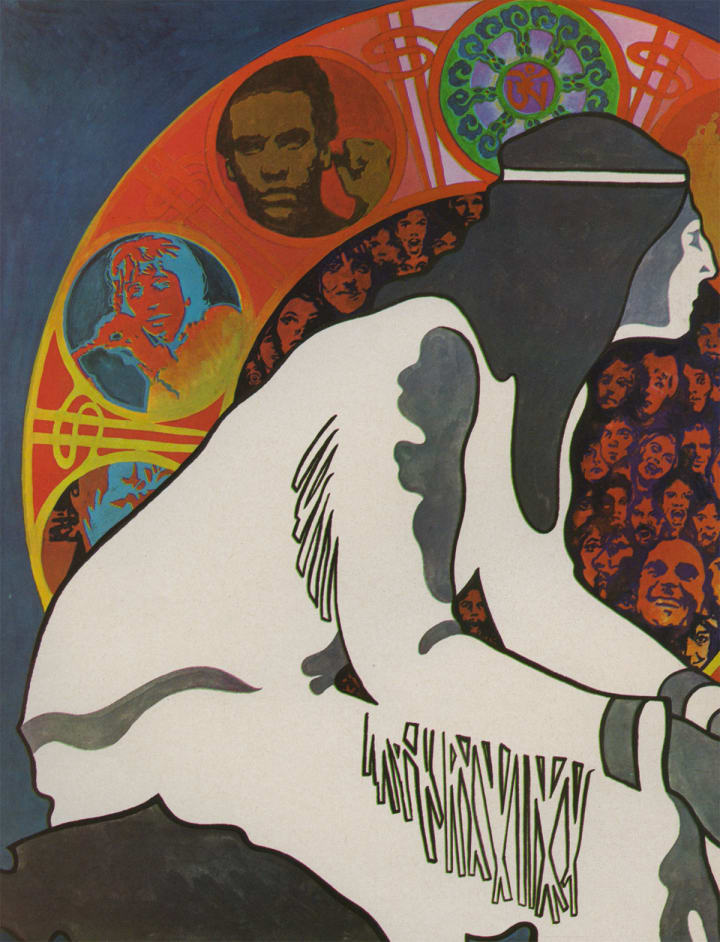
Who Are the Hippies?
I was a long-haired hippie freak years before reporters invented the word. I lived in the East Village and in Haight-Ashbury, and I spent time in every hippie community on the East Coast. I was even a biker before most of the cycle clubs formed, and I can still remember when those hoods walked around the streets in their colors while I rode my chopper past them. But the bikers were not really hippies—they were more like obnoxious distant cousins. The early hippies were a bunch of disturbed middle-class kids who had always been social outcasts from their own peer groups.
These hippies were kids that just couldn't make it in the post-1950s because dealing with their own hangups was a full-time business. They turned to drugs, eastern culture, and therapy in an attempt to "get their heads together." They sought each other out because they could only communicate with those whose problems were similar. The early hippies were a pitiful lot, but most of them were sensitive, intelligent people. Nearly all of them were college students or college dropouts—usually writers, artists, or musicians. But we were also living out a romantic fantasy, identifying with the earlier beatniks who captured our imagination as children.
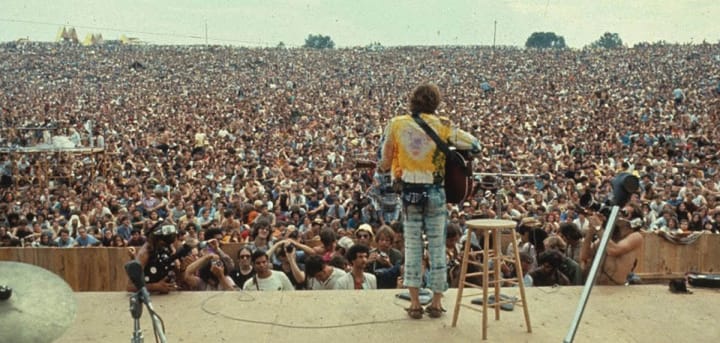
Photo via Live for Live Music
It Ain't Easy
Life for us was hard. No one had much money, and few had it together enough in their heads to hold a job. Every day was a struggle for a place to crash, some food, a little grass, or any of the amenities of life we could possibly get our hands on. There wasn't much generosity in this scene either—everyone wanted to hold on to what little they had, as we were a pretty insecure bunch. That's where things were really at when the reporters found us and started publicizing the so-called "Summer of Love."
The Summer of Love was one of the all-time media hypes. I know. I was there. Never before have so many believed so much baloney about so few. Historically, it should go down as the "Summer of the Rip-off" because that was the real theme. The cops ripped-off the hippies, and the freaks ripped-off, burned, and beat anyone—particularly other naive hippies, their eyes clouded by visions of love and brotherhood. It was an incredible free-for-all; no one was safe. Suppose, for instance, you're a hippie who takes home a hungry runaway needing a place to sleep. You stand a damn good chance of waking up the next morning with the waif gone, along with anything else he could quietly carry out the door. The only thing you could expect for your trouble is a case of the crabs. Well, these kids had nothing and you had something.
Then there were the burn artists, and they were everywhere. Their method of operation was direct. They would approach you on the street and offer to sell you some weed. Often they would give you a stick to smoke, and if you found it agreeable they would take your money and disappear into a nearby building. After about an hour's wait you usually got the message—the guy wasn't coming back. It's a rare to find a hippie who hasn't been through this number at least once.
But the worst were the rip-off artists—a really ugly group of people adept at breaking and entering if they heard you had something worth taking. The more advanced forms of the rip-off usually happened to someone who was dealing drugs—almost every hippie at one time or another. Here the rip-off artist would spend time getting to know the dealer, getting high with him or her, or just by becoming a frequent customer. When he knew enough about the dealer's operation, an especially large transaction would be proposed. Then, when the deal was about to be consummated, a gun would be pulled, and the drugs, money, and all valuables taken. One dealer I knew was riding in a car with his biggest customer when the customer pulled to a sudden stop, and two hired thugs jumped in—one on each side. They systematically worked the dealer over until he led them to his drug stash worth over $10,000. The next day he got out of hospital and gave up dealing.
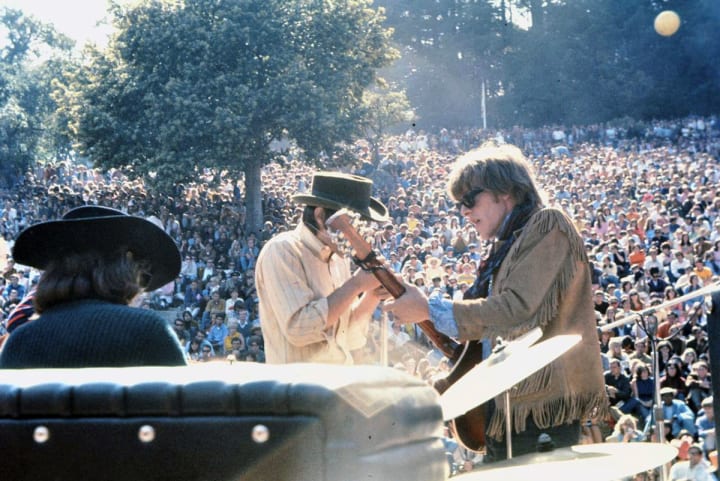
Photo via Wikipedia
Hippie Frauds
Yes, that was the Summer of Love, though no one ever tells it that way. The Haight and the Village were full of hustlers exploiting the peace-love rap. True, there were also some people who really tried to be warm and open. They were the ones who didn't talk about brotherhood—they just exuded it. The ones to watch out for came on mouthing poetry about peace, harmony, and beauty—and there were plenty of them.
Initially, the hippie population was restricted to large cities and a few "in" small towns. But after a year the hippie phenomenon hit middle-sized and even small cities as new converts rolled in by the thousands. These were the Second-wave freaks who were to become by far the vast majority of the alternate culture. The second, third, and subsequent waves were ordinary middle-class kids with just the usual amount of problems. They were not nearly as disturbed as the original freaks. They were the fad followers—the same kinds of kids that turned to surfing and souped-up cars in the 50s. They came from comfortable white-collar families that own ranch houses and barbecues in the suburbs. To them, hippies represented romance and adventure.
So they moved out of their parents' homes and into the hippie ghettos in a vain attempt to drop out of the materialist society that spawned them. In the name of personal freedom they dropped into the hip underground with just a few of their possessions—$1,000 worth of stereo equipment, 300 stereo discs, and a wardrobe of hippie clothing that cost three times as much as conventional square clothing. They also brought their middle-class emotional and intellectual conditioning, which they are not even aware that they possess. The simple fact is that you can't grow up in any environment and not expect to be, consciously or unconsciously, a product of it.
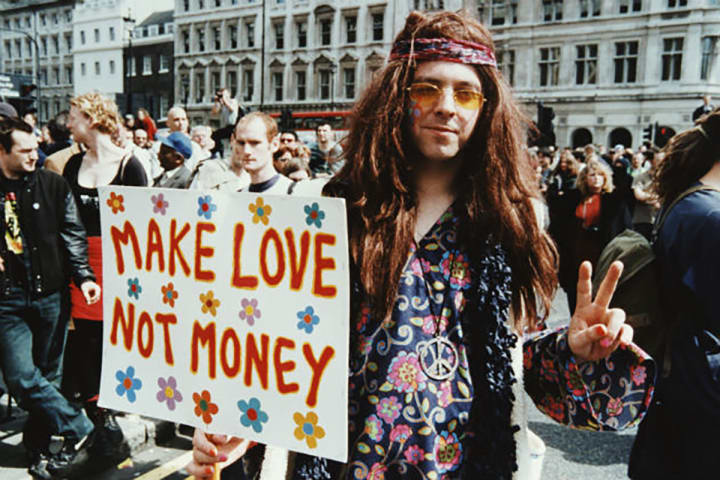
Image via Getty Images
You Are Who You Are
Besides, no one really drops out, at least not for very long, because you can't exist without money. Early hippies sold drugs or went on welfare. Later middle-class hippies work for a living. They can be seen stocking shelves at the corner A&P or writing ads on Madison Avenue. Many are heavily into the youth fashion market, while others have their own stores and businesses. There is scarcely a difference between hip capitalism and plain old pre-psychedelic capitalism, except that a few long-haired freaks are raking in the loot rather than some balding middle-aged shopkeeper.
Nor are their social lives any different from their parents'. Hippies don't go to parties often, or even visit much. They live quietly. When the breadwinner comes home at night, he and his old lady generally spend the evening in front of the tube. Then, the next day everyone (straights and hippies alike) goes out and buys the same dog food and toothpaste. Could anyone seriously say that there is a difference between the basic laissez-faire philosophy that has prevailed in this country for the last couple of centuries and the hippie credo of "do your own thing?" And what is the difference between a hippie wedding ceremony and a church wedding except a few more rituals, some bare feet, and lots of flowers? Even their ideals are almost identical—while their parents wanted a family and a house in the suburbs, the hippies want a family and house in the country. Who could blame them? The suburbs have been overcrowded for years.
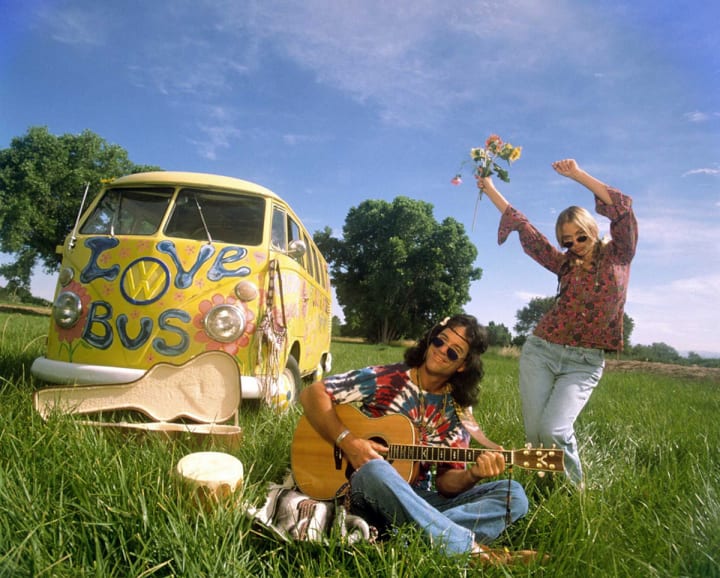
Photo via Getty Images
What Would Hippie-Jesus Do?
Then there is the religion thing. All these kids were raised with some religious training, so it comes as no surprise that when they got into the drug bag they started picking up on Eastern teachings. They even started their own churches and congregations all over the country. In the large cities there are dozens of sects and devotional groups—all with the same financial, administrative, and membership hangups that plague established churches. Still, it's an attempt to be one with God, just as they were brought up to believe.
Now an even stranger thing is happening—many of these young boys and girls are returning to the fold. The Jesus movement is springing up all over the country and its new converts look suspiciously like hippies. Stories of entire California motorcycle gangs converting have appeared in print. Photos of bearded, long-haired Christians preaching to a similar congregation can be seen in Look and other publishing institutions. Mass baptisms of hundreds of youthful converts threaten to be de rigueur. If that's not Middle America, I'll eat my sandals.
Yet a disquieting antagonism still exists between the middle-class culture and the so-called alternate culture. Hippies are blamed for everything, with particular emphasis on anti-war activities and revolutionary movements. This is not to say that there haven't been freaky-looking activists, but the truth is that hippie involvement in politics has been minimal. For instance, if you looked at all the people that went to all the Mobes, you would see that they were mostly clean-cut students, housewives, and concerned white-collar workers. A march by a few hundred thousand freaks would have been meaningless. On the other hand, the Mobe and other big anti-war demonstrations were well funded and carefully organized to include all strata of society—the key to their effectiveness.
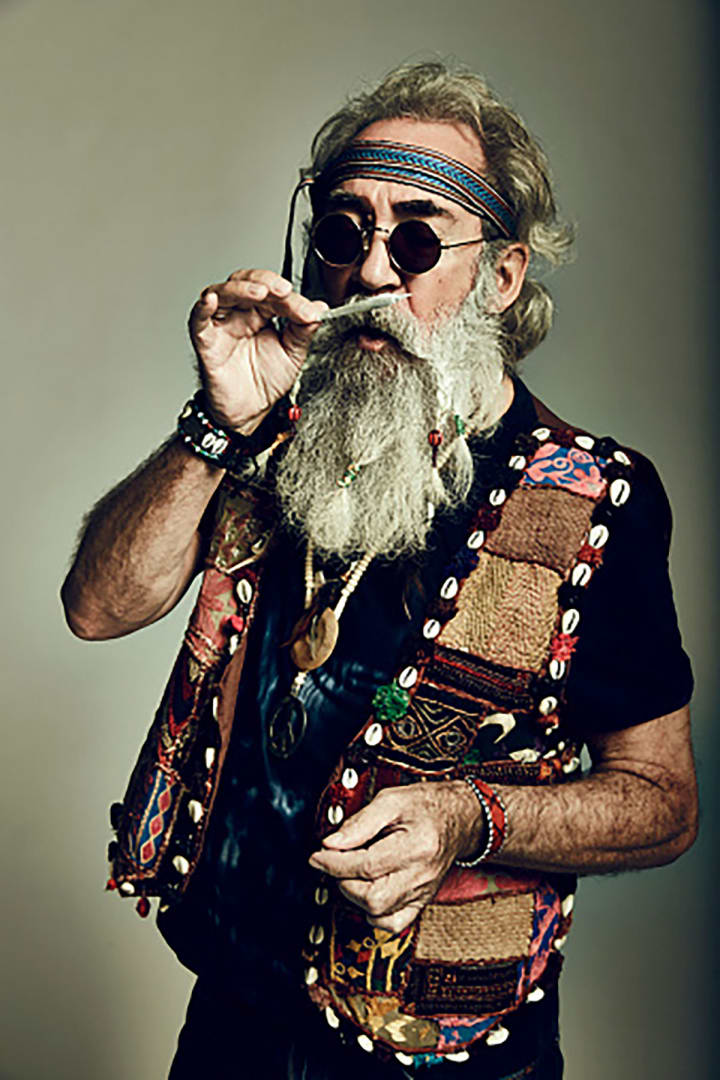
Photo via Getty Images
A Revolution
To attribute the radical movement to the hippies is equally absurd. One of the best-publicized traits of the alternate culture, and one of the few correctly reported, is an overwhelming social and political apathy. Just like their middle-class parents, the hippies' main concern is "getting it together," which means providing security for only themselves. Hippie activists only began to appear when they became a minority big enough to be worth organizing. In stepped longtime organizers Jerry Rubin and Abbie Hoffman, who were nothing more than political opportunists. The Youth International Party (YIP) was a shrewd attempt to capitalize on the fact that within ten years, half the men and women of voting age would be under 30. Meanwhile, Rubin and Hoffman reasoned, they could get in on the ground floor and grab a power base now. Along the way they became a trifle violent (on purpose) and gave the hippies a bad name to boot.
The Yippies have failed, just as plans for a violent youth revolution have failed. Perhaps the reason is that none of the sharpies cared to remember their history lessons. There has never been a revolution started or executed by the middle class. The middle class is the enemy of revolution, and the hippies— emotionally and intellectually—are hopelessly middle-class. In a revolution, the only people with anything to gain are the lower classes, who are used for manpower by aristocrats and intellectuals who start the revolution for some ideal or more power. Besides, real revolutions are puritanical and disciplined in nature. Drugs, wild sex, and other sensualist behavior cannot be allowed in the rank and file—hedonists such as the hippies make poor revolutionary soldiers. Eldridge Cleaver recognized this and sent a message from Algeria ordering all his remaining Panthers to stay away from drugs, because they were the system's way of weakening their will.
Revolutionary talk among hippies was exactly that: talk. And the only reason there was any talk in the first place was that they themselves were feeling some of the sting of inequalities that other minority groups had been feeling for years. Mostly, though, they were tired of being busted for pot, so revolutionary talk was an outlet for their frustrations. Naturally, when the first bit of violence occurred, they realized that the other side was playing for keeps. Talk immediately turned to something called a cultural revolution.
Still, it is no mere mistake that hippies are confused with revolutionaries. The radicals have found that by growing their hair long and affecting hippie garb, they can keep their identities hidden or disappear into the alternate culture when things get too hot. The FBI and other investigatory agencies publicly admitted that they had lots of trouble ferreting out the hardcore radicals from the hip communities. This use of the underground by the radicals put more heat on the hippies—perhaps radicalizing a few in the process.
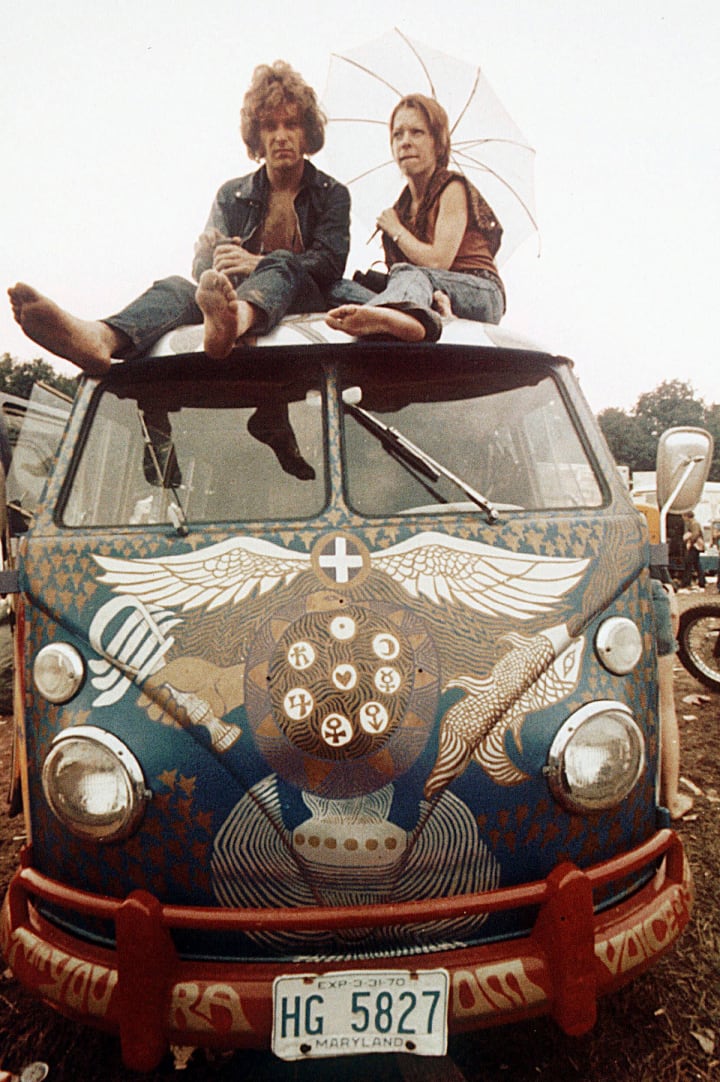
Photo via BuzzFeed
Just a Fad
Alternate cultures are not so much a reality as an ideal—an ideal that gets put aside when faced with the more pressing obligations of day-to-day living. Working to support a wife and kids leaves no time or energy for loose living. Also, living an ideal produces a lifestyle that fails to provide its followers with any sense of security—and middle-class upbringing is based on security. After several months or years of braving it, most return to the fold gratefully. Generation Gaps, after all, are nothing new. This is the third one in the 20th century, which has witnessed the flappers of the 1920s and the beatniks of the 50s. Our social institutions absorbed both these youth rebellions with scarcely a flicker. The wild kids of the 20s are now aging pillars of our communities.
And where are the beatniks of the 50s? I knew and lived with many of them. They all smoked pot as they reached middle age, had two or three kids, and held down jobs as teachers, therapists, shopkeepers, writers, and just about anything you can think of. Even the well known ones seemed to have taken up rather mundane existences. Jack Kerouac died when he was living with his mother in Florida. Then there was Ralph Metzner, one of the co-fathers of the psychedelic revolution, who got kicked out of Harvard along with Leary and Alpert. Afterward he taught out on the West Coast. Last time I saw him he looked very scholarly in a Brooks Brothers coat and tie. Similarly, Mario Savio and the other radicals of the California Free Speech Movement aren't marching anymore. Mario became a family man who said: "It's not so easy to get busted at the drop of a hat when I've got two children."
The hippies are no different. Many of the hardcore drop-outs returned to school. The turnover rate in the hippie ghettos is phenomenal. They came by the thousands and stuck it out for a year or more in an apartment paid for by their parents. Then they went back to work in the family dry-cleaning business because it's easier and more secure than day-to-day existential living.
Some arrived with a child or two in tow and moved in with their parents. Others cut their hair and dressed Ivy League in readiness to take over the family firm. I returned to my upstate New York hometown. I wasn't too surprised to find that everyone I grew up with was back.
About the Creator
Ami Roach
Jewish Barnard graduate, surprise surprise.
Enjoyed the story? Support the Creator.
Subscribe for free to receive all their stories in your feed. You could also pledge your support or give them a one-off tip, letting them know you appreciate their work.






Comments
There are no comments for this story
Be the first to respond and start the conversation.